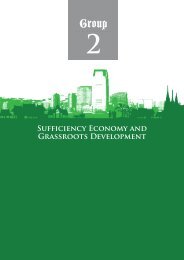Conflict, Legitimacy and Government Reform: Equitable Allocation of ...
Conflict, Legitimacy and Government Reform: Equitable Allocation of ...
Conflict, Legitimacy and Government Reform: Equitable Allocation of ...
You also want an ePaper? Increase the reach of your titles
YUMPU automatically turns print PDFs into web optimized ePapers that Google loves.
168 KPI Congress XI<br />
politicians’ as well as government employees, both in the central <strong>and</strong><br />
local sectors so they perform their jobs conscientiously with good intent<br />
free <strong>of</strong> corruption which will be a key driving force toward leading the<br />
nation <strong>and</strong> its citizens to civilization <strong>and</strong> well-being.<br />
The concepts <strong>and</strong> presentation <strong>of</strong> views broadcast through the roles<br />
<strong>of</strong> “NGOs” <strong>and</strong> “civil society” can be considered the representatives <strong>of</strong><br />
the people <strong>of</strong> the whole nation because we have to accept that the growth<br />
<strong>of</strong> social movement, civil society <strong>and</strong> NGOs have continually <strong>and</strong><br />
quickly adjusted <strong>and</strong> developed the work <strong>of</strong> new organizations under the<br />
political climate <strong>of</strong> Thail<strong>and</strong> which are highly contradictory <strong>and</strong><br />
susceptible to change while the complexity <strong>of</strong> the rapidly changing<br />
political structures at national <strong>and</strong> local levels. In addition, the 2007<br />
Constitution also provides opportunities for participation over a broad<br />
spectrum.<br />
The term “public policy” refers to the government’s performance,<br />
decision-making <strong>and</strong> resource allocation for the benefit <strong>of</strong> the people <strong>and</strong><br />
must be accepted as valuable <strong>and</strong> beneficial to all parties involved: 1.<br />
The government as policy maker, 2. <strong>Government</strong> employees as important<br />
mechanisms for policy compliance <strong>and</strong> 3. The people, whose needs will<br />
be responded to which bears an important impact on their lives. Both<br />
government employees <strong>and</strong> politicians must not forget that “The people’s<br />
voice is the voice <strong>of</strong> heaven”.<br />
As for the role <strong>of</strong> policy advocacy, the writer agrees with the key<br />
concept on another issue, i.e. the concept <strong>of</strong> “social welfare”, which is the<br />
outcome <strong>of</strong> the labor class’s fight against capitalists following the<br />
industrial revolution in 19th century, not by the government or capitalist<br />
h<strong>and</strong>-outs. Social welfare is a social system equally guaranteed to the<br />
government to all citizen in terms <strong>of</strong> basic needs for good quality <strong>of</strong> life,<br />
which is not just a matter <strong>of</strong> social welfare, but a matter <strong>of</strong> “social<br />
democracy” for managing the welfare state as stated by the saying<br />
“…from mother’s womb to the funeral pyre”.<br />
In this day <strong>and</strong> age, it has become evident that social context which<br />
is a “social current” coming from civil society <strong>and</strong> NGOs, as well as














